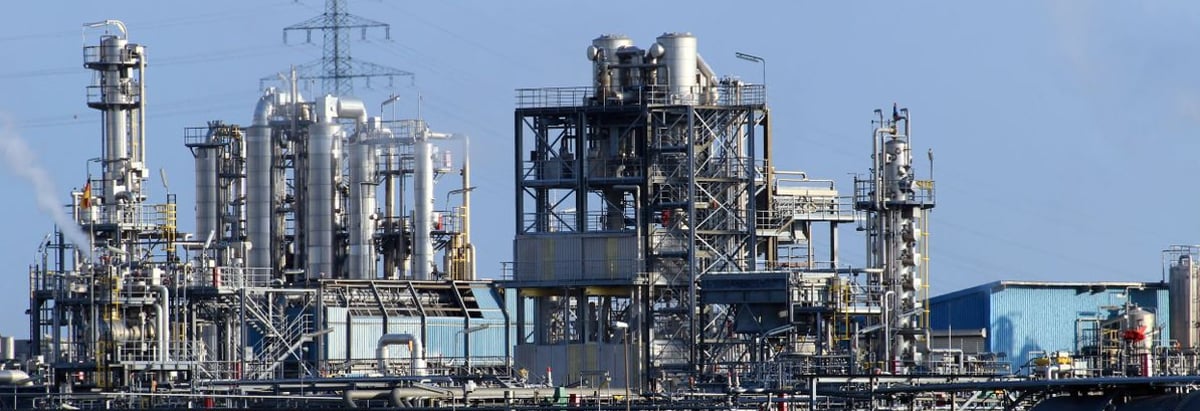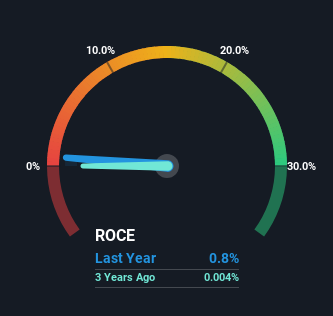- Taiwan
- /
- Oil and Gas
- /
- TWSE:6505
These Return Metrics Don't Make Formosa Petrochemical (TWSE:6505) Look Too Strong

Ignoring the stock price of a company, what are the underlying trends that tell us a business is past the growth phase? More often than not, we'll see a declining return on capital employed (ROCE) and a declining amount of capital employed. Basically the company is earning less on its investments and it is also reducing its total assets. On that note, looking into Formosa Petrochemical (TWSE:6505), we weren't too upbeat about how things were going.
What Is Return On Capital Employed (ROCE)?
Just to clarify if you're unsure, ROCE is a metric for evaluating how much pre-tax income (in percentage terms) a company earns on the capital invested in its business. To calculate this metric for Formosa Petrochemical, this is the formula:
Return on Capital Employed = Earnings Before Interest and Tax (EBIT) ÷ (Total Assets - Current Liabilities)
0.0079 = NT$2.9b ÷ (NT$430b - NT$62b) (Based on the trailing twelve months to September 2023).
So, Formosa Petrochemical has an ROCE of 0.8%. In absolute terms, that's a low return and it also under-performs the Oil and Gas industry average of 11%.
View our latest analysis for Formosa Petrochemical

In the above chart we have measured Formosa Petrochemical's prior ROCE against its prior performance, but the future is arguably more important. If you'd like, you can check out the forecasts from the analysts covering Formosa Petrochemical for free.
What Can We Tell From Formosa Petrochemical's ROCE Trend?
There is reason to be cautious about Formosa Petrochemical, given the returns are trending downwards. To be more specific, the ROCE was 27% five years ago, but since then it has dropped noticeably. On top of that, it's worth noting that the amount of capital employed within the business has remained relatively steady. Since returns are falling and the business has the same amount of assets employed, this can suggest it's a mature business that hasn't had much growth in the last five years. If these trends continue, we wouldn't expect Formosa Petrochemical to turn into a multi-bagger.
The Bottom Line
In the end, the trend of lower returns on the same amount of capital isn't typically an indication that we're looking at a growth stock. It should come as no surprise then that the stock has fallen 29% over the last five years, so it looks like investors are recognizing these changes. That being the case, unless the underlying trends revert to a more positive trajectory, we'd consider looking elsewhere.
Formosa Petrochemical does have some risks though, and we've spotted 1 warning sign for Formosa Petrochemical that you might be interested in.
For those who like to invest in solid companies, check out this free list of companies with solid balance sheets and high returns on equity.
New: AI Stock Screener & Alerts
Our new AI Stock Screener scans the market every day to uncover opportunities.
• Dividend Powerhouses (3%+ Yield)
• Undervalued Small Caps with Insider Buying
• High growth Tech and AI Companies
Or build your own from over 50 metrics.
Have feedback on this article? Concerned about the content? Get in touch with us directly. Alternatively, email editorial-team (at) simplywallst.com.
This article by Simply Wall St is general in nature. We provide commentary based on historical data and analyst forecasts only using an unbiased methodology and our articles are not intended to be financial advice. It does not constitute a recommendation to buy or sell any stock, and does not take account of your objectives, or your financial situation. We aim to bring you long-term focused analysis driven by fundamental data. Note that our analysis may not factor in the latest price-sensitive company announcements or qualitative material. Simply Wall St has no position in any stocks mentioned.
About TWSE:6505
Formosa Petrochemical
Engages in the petrochemical business in Taiwan, Australia, South Korea, the Philippines, Singapore, Malaysia, Mainland China, and internationally.
Moderate growth potential with mediocre balance sheet.


